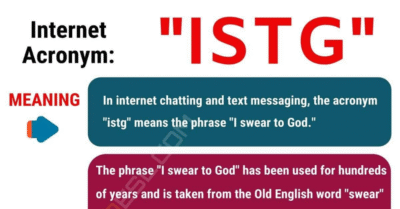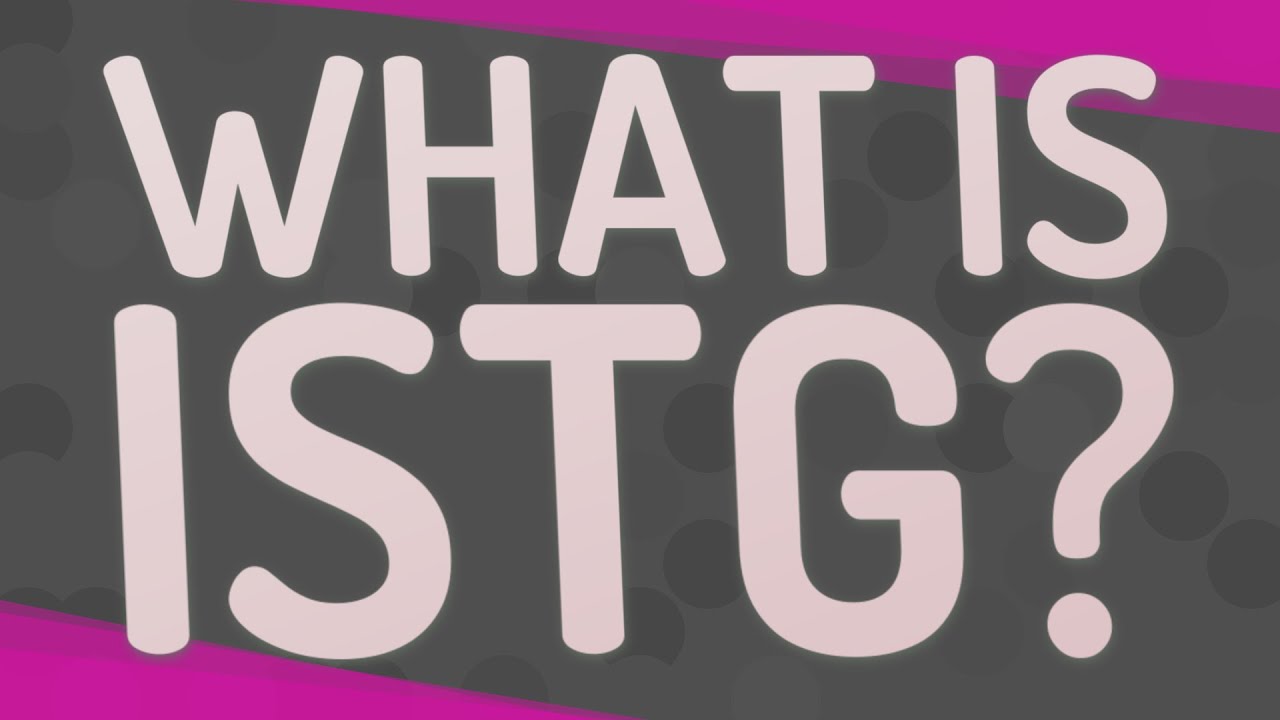In the digital age, internet slang has become an integral part of how we communicate online. From text messages to social media comments, abbreviation
In the digital age, internet slang has become an integral part of how we communicate online. From text messages to social media comments, abbreviations and acronyms make it easier and quicker to express ourselves. One such acronym that has grown in popularity is “ISTG”. But what does ISTG mean? In this article, we will dive deep into the meaning, usage, origin, and impact of this internet shorthand.
Must visit: experttrading

What Does ISTG Mean?
ISTG stands for “I Swear to God.”
It’s commonly used in informal digital communication to emphasize honesty, frustration, surprise, or emotional intensity. Whether you’re chatting with friends or tweeting your thoughts, ISTG helps convey strong feelings—without the need to type out a full sentence.
Let’s break it down:
- I = I
- S = Swear
- T = To
- G = God
This acronym expresses sincerity or an emotional reaction to a situation. It’s often used in contexts where someone is trying to stress that they’re telling the truth or feeling strongly about something.
Where Is ISTG Commonly Used?
ISTG is most commonly seen in the following digital environments:
- Text messaging: Among friends and peers, ISTG is often used in casual conversations.
- Social media: Platforms like Twitter, Instagram, TikTok, and Reddit are rife with acronyms like ISTG.
- Chatrooms and forums: It appears in comments, reactions, and even memes.
- Gaming communities: Players may use ISTG to emphasize a point during intense gameplay or in reaction to an event.
How to Use ISTG in a Sentence
Here are some examples of how ISTG might appear in different contexts:
1. Expressing Frustration
“ISTG if my phone freezes one more time, I’m throwing it out the window.”
2. Making a Promise
“ISTG I didn’t touch your stuff. It wasn’t me.”
3. Showing Disbelief or Shock
“ISTG that dog just opened the fridge by itself.”
4. Expressing Excitement or Emotion
“ISTG this is the best pizza I’ve ever had!”
Is ISTG Considered Rude or Offensive?
While ISTG isn’t inherently offensive, it can be seen as disrespectful or irreverent in certain contexts—especially around people who take religious expressions seriously. Since it includes the phrase “to God,” some individuals or communities may view it as blasphemous or inappropriate.
It’s best to consider your audience when using ISTG. Among close friends or peers, it’s usually fine. In formal, professional, or sensitive conversations, however, you may want to avoid it.
Alternatives to ISTG
If you’re looking for similar expressions that carry the same emotion but might be more universally acceptable, here are some alternatives:
- “I promise”
- “I’m serious”
- “No cap” (slang for “no lie”)
- “For real”
- “FRFR” (For real, for real)
- “I swear”
Each carries a similar intensity but may suit different audiences or tones.
The Evolution of ISTG and Internet Slang
ISTG, like many internet acronyms, reflects the evolution of language in the digital world. Slang terms like “LOL,” “OMG,” “IDK,” and “BRB” were some of the earliest digital abbreviations to become widely adopted. As online culture expanded, so did the vocabulary.
Gen Z, in particular, has played a major role in pushing new acronyms into the mainstream. ISTG gained traction through platforms like TikTok and Twitter, where brevity is not just practical, but often essential.
What makes acronyms like ISTG so popular?
- Convenience: It shortens longer expressions into a digestible format.
- Emphasis: The acronym can convey strong emotion in a way that full sentences may not.
- Trendiness: Using current slang helps users feel connected to online communities and cultural trends.
When Not to Use ISTG
Despite its popularity, there are specific situations where using ISTG might be inappropriate:
- In professional settings: Avoid acronyms and casual slang in emails, resumes, or work meetings.
- Around unfamiliar people: If you’re unsure of someone’s values or beliefs, it’s best to steer clear of potentially sensitive expressions.
- In formal writing: ISTG is purely informal and should never appear in academic, legal, or formal communications.
- During serious conversations: Sometimes, using slang can diminish the weight of a serious topic.
How to Respond to ISTG
If someone uses ISTG in conversation, your response will usually depend on context. Here are a few possibilities:
- If they’re making a claim: “Really? I believe you.”
- If they’re upset: “I get it, that sounds frustrating.”
- If they’re shocked or excited: “No way! That’s wild.”
Understanding the emotional weight behind ISTG can help you respond appropriately, especially if someone is trying to express sincerity or strong feelings.
Why ISTG Matters in Digital Communication
ISTG, while short and simple, represents a shift in how we use language. The rise of acronyms like this shows that:
- Digital language is adaptive. People continually find faster, more expressive ways to communicate.
- Tone matters. In a space where vocal inflection is absent, acronyms help convey emotion.
- Community is key. Using popular slang builds social bonds and aligns you with shared cultural norms.
In many ways, ISTG isn’t just a phrase—it’s a symbol of modern communication.
Common Misunderstandings About ISTG
Some people new to internet slang might misinterpret or misuse ISTG. Here are a few misconceptions:
- It doesn’t mean “Instagram.” While the abbreviation might seem like it could reference Instagram, it’s not used that way.
- It’s not a religious statement. Though it mentions God, most users mean it as an emotional intensifier, not a theological declaration.
- It’s not always serious. Sometimes ISTG is used sarcastically or dramatically for comedic effect.
FAQs About ISTG
Q1: What does ISTG stand for?
A: ISTG stands for “I Swear to God.” It’s used to emphasize sincerity, frustration, or emotion in informal conversations.
Q2: Is ISTG inappropriate to use?
A: Not necessarily. While it’s not offensive in most casual contexts, it could be seen as disrespectful in religious or formal settings.
Q3: Who uses ISTG the most?
A: ISTG is popular among teenagers, Gen Z, and frequent social media users.
Q4: Can I use ISTG in a professional email?
A: No. ISTG is considered informal slang and should be avoided in professional or formal communication.
Q5: What are some synonyms for ISTG?
A: Some alternatives include “I promise,” “For real,” “No cap,” and “I swear.”
Q6: Is ISTG used globally or just in English-speaking countries?
A: While it originates in English, ISTG has spread internationally thanks to the global reach of social media platforms.
Q7: How do I know if someone is being serious when they say ISTG?
A: Context is key. If it’s used in a serious situation, they’re likely being genuine. If it’s paired with humor or exaggeration, it may be playful or sarcastic.
Q8: Is ISTG used in voice conversations?
A: Rarely. ISTG is primarily used in written or text-based communication.
Conclusion
So, what does ISTG mean? Simply put, it’s an abbreviation for “I Swear to God,” often used to convey emotion, truthfulness, or frustration in digital communication. Whether you see it in a meme, a tweet, or a text message, ISTG has become a staple in online vocabulary.
Like many pieces of internet slang, ISTG reflects the evolving ways people communicate in an increasingly digital world. Knowing what it means—and how to use it appropriately—helps you stay fluent in the language of the internet.



COMMENTS